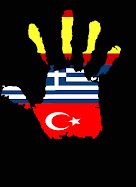
Es una tradición culinaria que endulza el paladar de niños y grandes en la noche del 5 de enero, mientras se espera la venida de los Reyes Magos siempre cargados de regalos, a pesar de la crisis. Los hay rellenos de nata, con frutas confitadas o sin ellas, y hasta con cabello de ángel, pero en todo roscón que se precie tiene que haber una moneda, el premio al ganador, y un haba seca, que señala al perdedor. Con este premio se rememora el juego de “rey por un día”, juego que nos trasporta a la corte de Luis XV de Francia en el que el afortunado que encontraba el premio gozaba durante un día de las prebendas a que su fortuna le había conducido: ser tratado con el máximo respeto y servido por amigos y cortesanos. Si nos remitimos a los orígenes de esta tradición tendremos que nombrar al pueblo romano, que celebraba sus fiestas en honor al dios Jano, cocinando unas roscas o panecillos similares al roscón.
Y quizá más interesante todavía resulte la coincidencia de esta tradición con un juego al que juegan los niños griegos, llamado Basilindas, en el que los niños griegos elegían de entre los suyos un rey, capaz de nombrar efímeros príncipes y dignatarios.
Entre nosotros, el roscón se suele acompañar con un buen chocolate calentito. Todo un manjar para los niños. Luego o antes, según costumbres, todo el mundo acude a la cabalgata de Reyes. En nuestra ciudad, la tradición es empezar la cabalgata desde el monte Bolón. Allí suben los chavales acompañados de sus padres portando antorchas que al caer el sol se ven desde la lejanía, causando la impresión de una serpiente chispeante de luces y destellos que se desliza por la ladera hasta las primeras calles de la ciudad. Nada más evocador que esta comitiva nocturna para creer de verdad en los Reyes Magos. Una vez más y sin faltar a su anual cita, los Magos de Oriente nos traen la ilusión y la esperanza perdidas que se nos quedaron prendidas en las hojas que hemos ido arrancando al calendario.
It is a bakery tradition which sweetens children and adults alike on January the 5th, while awaiting for the arrival of the Three Wise Men loaded with presents for all children (especially the well-behaved ones), despite the general crisis. This ring can sometimes be filled with cream, dried fruits or thin vermicelli. There must be two hidden items inside every ring: a dried bean and a litle figure of a king – or a coin -. The one getting the bean in his/her piece will have to pay for the celebration and the one getting the other will be honoured. In such way we recall the game “king for one day” which takes us back to the court of Louis the 15th of France where the lucky one who found the prize would be treated and served with the maximum respect by all their friends and courtiers for one day. If we go back to the origin of this tradition, we have to name the Romans, who held a celebration to honour the God Jano, cooking sweet dough rings and rolls similar to our “roscón”.
And we could also refer to the coincidence of this tradition with a game usually played by Greek children, called Basilindas, in which they elect a king among them with the privilege of naming short-lived princes and dignataries.
We usually take roscón soaking it in a cup of hot chocolate, especially tasty for children. Also on January the 5th, everybody goes to watch the Three Wise Men parade. In our town, Elda, the parade starts from Mount Bolón. All youngsters and some of their parents climb up the mountain after midday and light a bonfire, both to put up with the cold weather and to light the path for the paraders at dusk, when they use the burning fire to light wooden torches and start going down. In town, a shape of sparkling glimmers and lights can be noticed in the distance coming nearer from up the steep slope into the first streets. Nothing could be more convincing than this long congregation to really believe in the magic of the Three Wise Men.
Once more, without failing their yearly appointment, the Three Wise Men bring the happiness and hope which adults gave away together with the monthly sheets we tear off the calendar.
BIENVENIDA / WELCOME
Este blog es el instrumento de comunicación para todos los participantes en el Programa de Aprendizaje Permanente (P.A.P.) Comenius. Se trata de una asociación multilateral entre tres países: Turquía, Grecia y España. Nuestros centros educativos van a trabajar temas relacionados con la historia, las tradiciones, la religión, el ciclo festivo, etc. Y nuestro principal objetivo es estrechar los lazos que unen a estas tres culturas mediterráneas.
This blog is a communication tool for every participant in the Comenius Lifelong Learning Programme (L.L.P.). It is a multilateral association of schools in these three countries: Turkey, Greece and Spain. We are going to deal with subjects such as History, Traditions, Religion, The Festive Cycle, etc. And our main objective is to approach the similarities which these three Mediterranean cultures have.
This blog is a communication tool for every participant in the Comenius Lifelong Learning Programme (L.L.P.). It is a multilateral association of schools in these three countries: Turkey, Greece and Spain. We are going to deal with subjects such as History, Traditions, Religion, The Festive Cycle, etc. And our main objective is to approach the similarities which these three Mediterranean cultures have.
domingo, 4 de enero de 2009
El Roscón de Reyes / The Wise Men "Roscón"
Etiquetas:
GASTRONOMÍA / GASTRONOMY,
TRADICIONES / TRADITIONS
Suscribirse a:
Enviar comentarios (Atom)







 Ahmet Çallioglu Çok Programli Lisesi (Aydin, Turkey)
Ahmet Çallioglu Çok Programli Lisesi (Aydin, Turkey)
 Primary School of Afxentio (Xanthi, Greece)
Primary School of Afxentio (Xanthi, Greece)
 I.E.S. Monastil
I.E.S. Monastil



0 comentarios:
Publicar un comentario